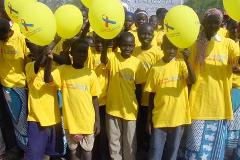HIV/Aids threatens South Sudan’s peace dividends
By Swangin Bismarck
Dec 1, 2006 (JUBA/RUMBEK) — Once referred to as ‘the last untouched pocket of Africa in regards to HIV/Aids prevalence, Southern Sudan now faces a massive threat from the pandemic.

The prevalence of HIV/AIDS in southern Sudan is said to be much lower than in neighbouring countries, but experts warn this is false comfort.
All the ingredients for the rapid spread of HIV/AIDS are here: up to four million displaced people returning home, poverty, very low school enrolment, a rudimentary health system, and the powerlessness of women and girls, combined with cultural practices, polygamy and widow inheritance.
All the above provide a fertile ground for a surge in HIV/Aids infection in Southern Sudan, a region which has in reality lost a generation to war and can’t afford to loose yet another generation to HIV/Aids.
With a limited data from the available UNICEF and partners supported Voluntary Counselling and Testing (VCT) centres, and little sentinel surveillance on the diseases, the dividends of the Comprehensive Peace Agreement signed last year to end two decades of war in the region could be wiped out by HIV/Aids.
UNICEF activities in the county have focused on awareness workshops, developing training modules and capacity building among local NGOs as well as establishing and supporting VCT centres, Prevention of Mother To Child Transmission (PMTCT) and emphasizing abstinence as the first choice for the un married.
One approach of awareness has been the life skills education programme, an integrated approach to provide youth and women among others with several skills tailored towards behavioural change.
The module for HIV/AIDS prevention incorporates information and activities on: Relationships; The facts about HIV/AIDS; Avoiding HIV; HIV, Gender and Culture; Violence and HIV; and Living with HIV and Caring for People with HIV and AIDS.
The outcome of the life-skills training are women and children who have acquired skills in critical thinking, decision-making, communication, negotiation, coping, and self-management which are significant interventions in the HIV/AIDS prevention.
Southern Sudan, a region whose population has born the brunt of war for two decades, it can not afford the luxury of delay.
The challenges of containing HIV/Aids in Southern Sudan are staggering but the opportunity to prevent HIV/AIDS from reaching epidemic exists now. It requires flexibility from UNCEF, partners and donors to rescue the future of Southern Sudan.
(UNICEF)
